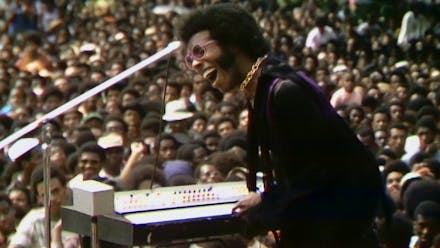Utilising beautifully restored footage buried in a basement for 50 years, Summer Of Soul (…Or, When The Revolution Could Not Be Televised) vividly paints a picture of the Harlem Cultural Festival, often referred to as the ‘Black Woodstock’, as the event the establishment just didn’t want to happen. A labour of love for director Questlove, best known as the ringleader of Jimmy Fallon’s house band The Roots, the resulting film is an important slice of cultural history, an expression of Black joy, and probably the best concert you’ll never go to.
From the outset, Questlove quickly sketches the backdrop to the festival, a time when American society was defined by racial turmoil, young Black Americans being sent to Vietnam as cannon fodder, unlawful murders and the unheard voices of the disenfranchised — such was the distrust of the police, the concert organisers brought in the Black Panthers as security. In Harlem, poverty and hardship were rife and priorities were different to the rest of the US. The same year as the moon landing, when a TV reporter poses a question about the importance of Neil Armstrong’s giant steps, one festival-goer bluntly says, “I couldn’t care less.” The film clearly demonstrates Harlem could have burned to the ground without the balm of the event.
Far more than just great music, _Summer Of Soul_ captures a specific transition point.
This is where Summer Of Soul thrives, in never-seen-before performances by some of the world’s greatest artists, showcasing electrifying sets from the likes of Stevie Wonder, Gladys Knight & The Pips, David Ruffin and the regal Nina Simone. Questlove drops in mini-portraits of where the artists were at the time — The 5th Dimension were delighted to play Harlem because everyone thought they were white — and employs a clever gambit of showing attendees and participants footage of the show, revelling in their delight or tears. But the musical highlight is Mahalia Jackson and Mavis Staples’ hair-raising rendition of ‘Take My Hand, Precious Lord’, Martin Luther King Jr’s favourite song. For Staples, it was overwhelming to perform with her idol; for the crowd, it is a moment of spiritual healing.
Far more than just great music, Summer Of Soul captures a specific transition point, a time when Black Americans started embracing Afrocentric fashion (dashikis and Afros) and the term Negro was symbolically dropped in favour of the term Black. As leaders of the Civil Rights movement were being murdered in their droves, the expressive, brightly dressed performers of the Harlem Cultural Festival emerged as superheroes from the rubble. Questlove gives space to Charlayne Hunter-Gault, one of the first two Black students at the University of Georgia in 1961, who spent her days being hounded by the white girls in the dorm above her pounding on the floor; she only got through it by listening to Nina Simone. To be young, gifted and Black was to live with a target on your back, but, as Summer Of Soul proves, it also meant having music as your greatest weapon.


